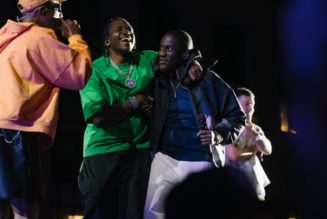
Inside a Nevada clothing warehouse, a song describing a woman’s murder blasted from commercial-strength speakers, as did other musical selections glorifying abuse and denigrating women, a lawsuit alleged.
The rap music would often overpower the 700,000-square-foot S&S Activewear facility in Reno — and helped foster an environment rife with discrimination and harassment, according to the suit, which was filed in 2020 by eight former employees, including seven women and one man.
That lawsuit was initially tossed out in December 2021 by a lower court, which argued that, since the music offended both men and women, it “did not constitute discrimination because of sex.” Last week, the U.S. Court of Appeals for the Ninth Circuit rejected that notion — ruling that “an employer cannot find safe haven by embracing intolerable, harassing conduct that pervades the workplace,” Judge M. Margaret McKeown wrote in a court opinion.
Attorneys representing S&S Activewear did not immediately respond to a request for comment from The Washington Post.
The court’s ruling not only revives the case against the clothing distributor by sending the lawsuit back to a trial judge but also sets a precedent for workplace sexual-discrimination claims, said Mark Mausert, an attorney representing the employees.
“The implications here are important,” Mausert told The Washington Post. “ … And it’s time for businesses to pay attention because these cases, after all, are about the work environment.”
According to the lawsuit, the blaring music was “inescapable” inside the Reno warehouse, where at least five speakers were often driven around on forklifts. The employees alleged that they were subjected to songs by Eminem and Too Short that they said glorified violence against women, for instance describing a young girl dying after a graphic instance of sexual violence. (Representatives for Eminem and Too Short didn’t immediately respond to The Post’s requests for comment.)
But it wasn’t just the music that was offensive, the suit alleged — it was also the behavior it inspired in male employees, who allegedly shared pornographic videos, made sexual remarks, yelled obscenities and pantomimed sexual intercourse while the songs played.
“Just playing these songs is itself a form of sizable harassment,” Mausert said. “It’s an implicit invitation for people to act out because you’re permitting misogyny and violence to be loudly broadcast.”
Under Title VII of the Civil Rights Act, employers must protect workers from discrimination based on religion, race, nationality or sex. Sexual harassment is unlawful “when it is so frequent or severe that it creates a hostile or offensive work environment,” according to the U.S. Equal Employment Opportunity Commission. That, Mausert said, means “whether an employer likes it or not, they’re the policeman of the workplace when it comes to displays of human sexuality.”
According to the lawsuit, employees complained daily about the offensive music, to no avail. Instead, S&S Activewear management allegedly told them the music was motivational, prompting several employees to quit over “the prevalence of the foul rap music and various other forms of sexual harassment,” the suit stated.
The songs that described sexual violence against women could have been particularly upsetting for employees with their own histories of sexual violence, Mausert said.
“Ask yourself how a woman or man who went through that horrible experience would react to being retraumatized at work every day by that song and by a bunch of guys happily singing along to that song,” he said.
The music played in the warehouse for nearly two years, until the company’s management learned the eight employees had obtained counsel and intended to take legal action, the lawsuit alleged.
A judge initially determined in 2021 that the music didn’t violate workplace anti-discrimination law since “both men and women were offended by the work environment allegedly created by the music played in the warehouse” and “all employees in [its] Reno warehouse were exposed to” the music, as S&S Activewear argued.
The eight employees soon appealed — a move that was supported by the Equal Employment Opportunity Commission, which urged the court to proceed with the lawsuit in an amicus brief that raised concerns over the “uniquely violent, misogynistic and sexually offensive music.”
But earlier this month, the Ninth Circuit court cited other cases in which plaintiffs had successfully sued over offensive sexual content in the workplace that wasn’t specifically directed at them. The lawsuit had been improperly dismissed, the court ruled.
“Whether sung, shouted or whispered, blasted over speakers or relayed face-to-face, sexist epithets can offend and may transform a workplace into a hostile environment,” McKeown wrote in the court opinion.









